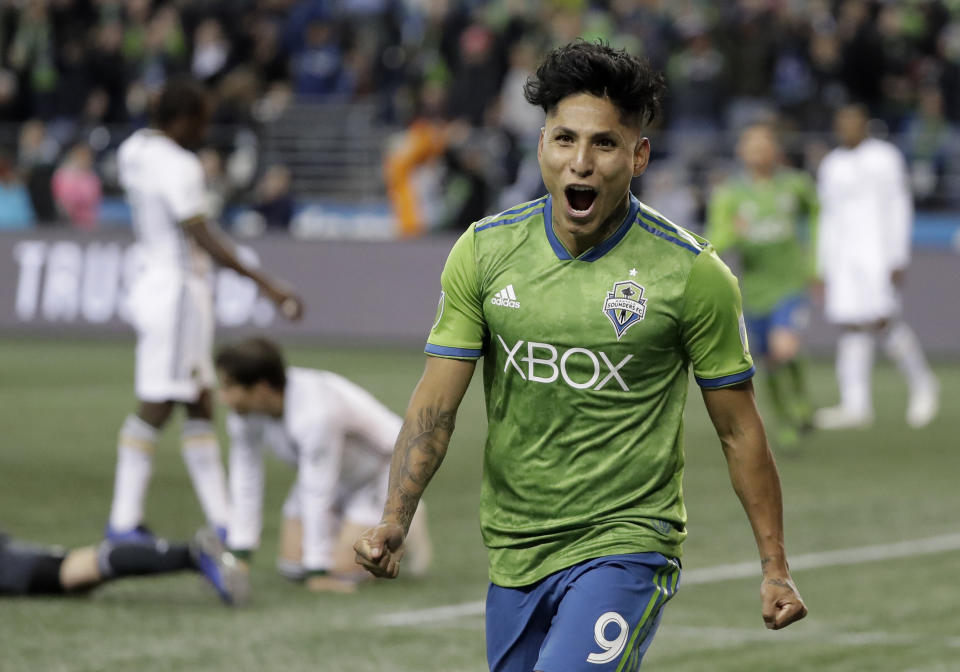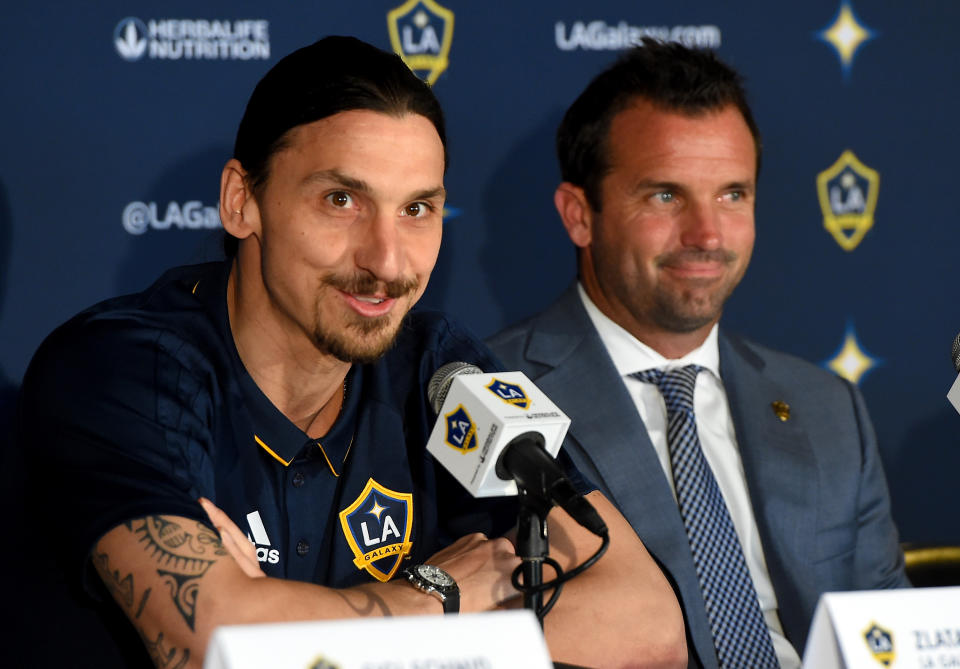McIntyre's 23 Thoughts: How to fix MLS's broken playoff format, Zlatan's future in LA, Jesse Marsch

Doug McIntyre’s weekly MLS column, 23 Thoughts, parses through the latest insights and inside info from around American soccer.
So the Portland Timbers advanced on penalties Thursday — or in other words, by a roll of the dice — to the Western Conference finals after beating the Seattle Sounders in the crapshoot shootout tiebreaker.
What sort of justice is that for a Sounders team that actually won the match 3-2, tied the two-game series on aggregate 4-4, plus finished five points higher than their blood rivals over the course of the 34-game, seven month-long regular season, to be eliminated in from the penalty spot in front of almost 40,000 of their closest friends?
Once again, the team that earned more points is out, and to an opponent unable to outscore them over the two games. Unfortunately, this is not an outlier. The same thing happened four years ago to the Supporters Shield-winning Sounders, who went out despite beating the Galaxy 2-1 in the decider because they’d dropped the first leg 1-0.
It could happen again on Sunday when, because of the league’s nonsensical playoff format, a New York Red Bulls team that just set the record for the most regular season points in MLS history would be eliminated with a 2-1 win at home. Why? That’s seems like a draconian consequence for losing on the road by the slimmest possible margin.
Look, I love covering MLS. Thursday’s match, which finished at 1:36 a.m. on the east coast, was an instant classic, entertainment of the highest order. That only makes it more maddening that the league still can’t figure out a way to give any tangible home-field advantage in the conference semis and finals to the teams that have earned it over the course of a long season. It would be so damn easy to fix. How? Simple: Force the underdog to win the series outright.
1. The higher seed has advanced after losing the opener of a two-leg playoff series just three times since MLS went to the home-and-home 15 years ago. The introduction of the away-goals tiebreaker in 2014 made things even harder for the better squads, whose reward for regular season excellence is to travel, on short notice, to the home of lower seed for the opener. Because of away goals, a lower seed can actually knock out a higher seed without winning either of the two games, or outscoring them over 180 minutes.
2. There have been many suggestions about how to remedy this. Recently, Fox Soccer analyst Stuart Holden made the case for single elimination games hosted by the higher seed throughout, as it is in the knockout round and in MLS Cup. I like that idea. Thing is, owners want more playoff games, not fewer, in order to maximize revenue. They don’t want a team reaching the final without playing a single postseason match at home.
3. I also get that the league is loathe to change the format too often. They want consistency. Forcing the lower seed to win — the team with the better regular season record would need only an aggregate tie to move on — is a minor tweak that would resolve a major problem. It would make the regular season more meaningful. It would also make for better playoff games, because the lower seed would be chasing a two-leg series from the start. A similar tiebreaker has been used in Mexico in years past. I’ve been beating this drum for years. In 2016, MLS VP of competition Jeff Agoos told me the league would consider using regular season points to beak postseason ties. Commissioner Don Garber announced the next day that no changes would be forthcoming. Here’s hoping they really look at it this time.
4. Sunday’s winner take all tilt between the Columbus and New York (again, the Crew can advance even if the hosts win) will have fans at Red Bull Arena biting their nails. Almost 4,000 miles away in Leipzig, Germany, former Red Bulls coach Jesse Marsch will be watching in the middle of the night and doing the same.
“I’ve missed one game since I’ve been over here,” Marsch, who left in July to become an assistant at Bundesliga side (and Red Bulls sister club) RB Leipzig, said when we caught up over the phone earlier this week.

5. Many MLS matches are available on German television and streaming services these days, but at times Marsch has had to get creative. “Sometimes I’ll find some random stream and watch the match in Russian,” he said. That’s not the only thing he’s had to get used to. “In the beginning, watching them play was weird,” he said. “The first game was the derby match [against New York City FC] and I was in a hotel room yelling at the TV. It was so uncomfortable. But as time is going on it’s become more normal.”
The time difference means that he’s up at all hours. Sunday’s contest kicks off at 2:30 a.m. local. Leg 1 was the exception. The afternoon tilt in Columbus meant the entire Marsch family could watch together. Marsch’s wife and three kids, ages 17, 15 and 11, also remain huge fans. “We were all saddened by the result but also positive and ready for the next leg, knowing that the team will be ready as well.”
7. In some ways, it’s like Marsch never left. He keeps in close contact with his former players and Chris Armas, the man who replaced him at the helm. It helped that the Red Bulls actually improved after he left, leapfrogging Atlanta United to win the Shield with a league record 72 points. “Chris has proven how good he is, but it was easy for us all to see that he was going to be successful,” Marsch said. Still, leaving in midseason after three-plus years in Harrison, New Jersey wasn’t easy.
8. “The decision on one level was simple and another level very complex,” he said. “The simple part was the team was in good shape, it was in good hands with Chris, the club is stronger that I think it’s ever been, and it’s built for success for many years to come.
“The complex part was that emotionally I was so invested in the relationships there and the people and the project that the thought of leaving was very stressful.” Marsch continued. “But in the end, I talk so much to my players about the process of growing and getting better that I think it’s only natural that the next step in my path was to come to Europe and learn from the way things are done here. It’s been great to see the club not suffer but thrive since I’ve left.”
9. Uprooting his life and moving to Germany wasn’t easy for Marsch or his family, but they were well prepared. It’s not the first time they’ve relocated to a foreign city and had to learn a new language, as Marsch spent the 2012 MLS coaching the Montreal Impact. “That was massive for us in terms of adjusting to a type of lifestyle that’s different to America,” he said. “Even though it’s Canada, Montreal was enough different where we had a lot of little logistical hurdles to overcome. I think it’s prepared us to be resilient and stick together and to also look at the positives and enjoy the different things that a foreign lifestyle gives you. There’s been plenty of challenges along the way but I’m really proud of my family for the way they’ve dealt with it. It’s getting easier every day.”

10. Marsch took German lessons before he left. He’d spent time in Leipzig previously, including a five-week stay a couple of winters ago, so there was some familiarity there. “The main thing has been becoming fluent in the language. I do video sessions in German, interact with the players in the staff in German. It’s not like everybody slows down and waits for me to understand or translates to English.”
11. Has he been accepted by the players? “You earn respect every day working hard giving everything you can to the group, sharing your ideas and finding a way to commit to your role to the fullest. That part is pretty simple. That’s the way our business works,” he said. “The only thing that’s sort of an added wrinkle is taking my leadership style and now implementing it as an assistant coach instead of the head coach. But I’ve done that before, too.” Marsch previously served as an assistant with the U.S. national team under current LAFC boss Bob Bradley.
12. Now that he’s seen the Bundesliga up close for four months, I was curious what differences Marsch noticed between the German top flight and MLS. “There still a gap. I don’t think anyone would dispute that. That’s not knocking MLS, it’s the reality of where things are at right now,” he said. “It’s like my eye has been adjusted to the speed of the Bundesliga now. When I’m watching games I’m just picking up on some of the similar details, some of the identical thoughts that we’re trying to establish and want our team to be about. But it’s just done quicker and better.”
13. When Marsch talks about similar details, he’s referring to RB Leipzig high press. Watching them play, you notice right away how closely it resembles the New York Red Bulls’ system. There are universal similarities, too. “Still a big piece of the puzzle is how people fit, how they work together, how they talk to and challenge each other,” he said. “That part doesn’t change no matter where you go. That for me is so much of the fun of coaching.”
14. I couldn’t let Marsch go without asking him if he’d been contacted, even informally, by U.S. Soccer about the vacant national team job. He said he hasn’t been. “I think everybody understands that I am right now immersed in this project, in this adventure,” he said. “The national team job isn’t something you campaign for. That’s a huge responsibility to the sport in our country, and if I’m lucky enough down the road to be considered for that job I hope my experiences here will help prepare me for it.”
15. The LA Galaxy have been in the news a lot since the season ended. We reported last week that the club had interviewed former coach and general manager Bruce Arena for a front office position. On Tuesday, team president Chris Klein confirmed that MLS’s most successful club would “hire a new lead for our soccer operations” and would do so “in short order” after firing VP of soccer ops Pete Vagenas following a second straight playoff miss.

16. You have to wonder at point Klein himself will be held accountable for the Galaxy’s decline. He hired Vagenas as well as head coaches Curt Onlafo and Sigi Schmid, neither of whom survived a full season in Los Angeles. “We all have to look at ourselves and take responsibility,” Klein said. Part of that appears to be Klein taking more of a hands-off approach when it comes to soccer decisions. That’s probably a good place to start.
17. I don’t think Arena gets the job. My understanding is he has not heard from the Galaxy since being interviewed, or at least he hadn’t as of last week. The well-connected Sam Stejskal reported that the club has serious interest in Mexican national teams director (and former Chivas USA GM) Dennis te Kloese and was not looking to hire Arena “at this time.”
18. Who would coach the team? We reported months ago that the club had been in contact with former Crew maestro and current Boca Juniors manager Guillermo Barros Schelotto, but I bet on him going to Atlanta to replace fellow Argentine Tata Martino. According to SI’s Grant Wahl, the Galaxy are also interested in USMNT frontrunner Gregg Berhalter. I’m told that they’ve also spoken to ex-Timbers coach Caleb Porter, though not recently.
19. It sure sounds like Zlatan Ibrahimovic will be back with the Galaxy next season now. “I know he has certain things that he wants,” Klein said. One source close to the club told me that among those requests was that Vagenas be let go. That’s extremely troubling if its true. The last time the Galaxy let its star attraction call the shots, as David Beckham and his handers did in 2007-08 before Arena came in and restored order, it didn’t go well, with the club missing the playoffs both years.
20. It sounds like Romain Alessandrini will stay in Southern California, too, despite the interest from the Impact. My understanding of the plan to keep Zlatan is that the Galaxy will use targeted allocation money to buy down Alessandrini’s salary below the designated player threshold, thus opening up a DP spot for Ibrahimovic.
21. If Zlatan does return, I have to think it will be as the highest paid player in MLS. Toronto’s Sebastian Giovinco was tops this season, at $7.1 million.
22. The same source who said that Ibrahimovic wanted Vagenas gone said the Swede respects Dom Kinnear and would like him to return as coach. Kinnear, who won two MLS Cups with the Houston Dynamo, stepped in on an interim basis after Schimd was sent packing in September. We shall see.
23. I still expect Berhalter to be named as U.S. coach, but not any time soon, even if the Crew bows out on Sunday. With the U.S. in action in Europe over the next two weeks (the USMNT plays England next Thursday and Italy five days later) any announcement wold be difficult to pull off logistically. The following week is Thanksgiving. And if Columbus were to reach MLS Cup on Dec. 8, that would obviously push the timeline well into next month.
Doug McIntyre covers soccer for Yahoo Sports. Follow him on Twitter @ByDougMcIntyre.
More soccer on Yahoo Sports:
• Ronaldo’s latest golazo a reminder to enjoy him, Messi while you can
• Pulisic returns to the USMNT for friendlies against England and Italy
• MLS Playoffs: Atlanta leads NYCFC, Red Bulls and Sounders on brink
• Liverpool ties streaking Arsenal, stays unbeaten in Premier League

